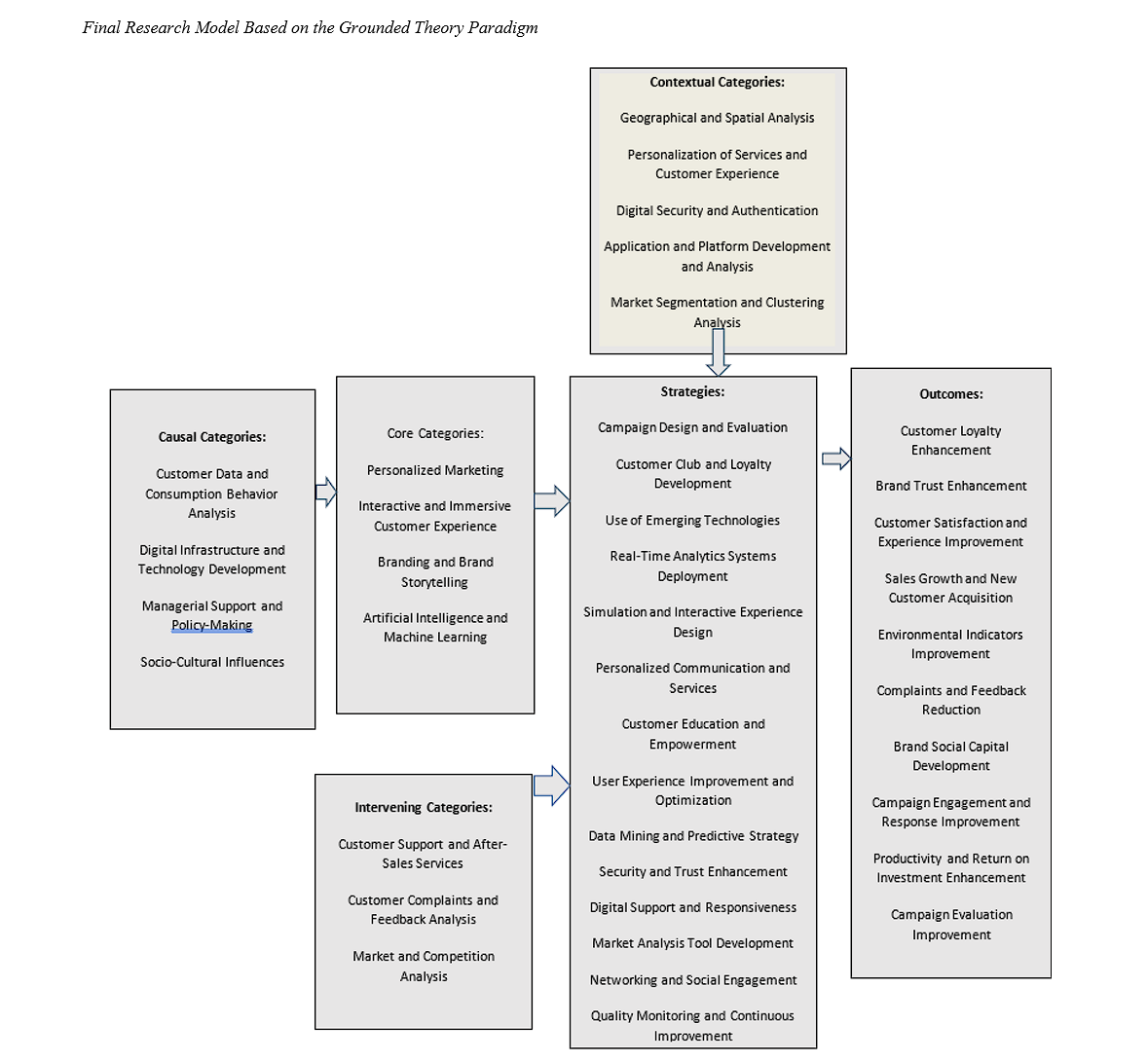Designing a Hyper-Personalized Marketing Model for Clean Fuel Campaigns Using a Grounded Theory Approach
Abstract
In the last decade, personalized marketing, and particularly hyper-personalized models, have faced multiple challenges in the field of energy and clean fuels. The first major challenge is the lack of comprehensive and adaptive models for predicting customer behavior and designing targeted campaigns that enhance engagement, loyalty, and personalized purchasing experiences. Moreover, existing studies have primarily been conducted in general industries or traditional e-commerce, while there is a clear lack of comparative research in the field of clean energy and the environment. The purpose of this study is to design a hyper-personalized marketing model for clean fuel campaigns by utilizing a grounded theory approach and analyzing customer behavior to optimize customer experience, loyalty, and the effectiveness of digital advertising. This model, with a focus on integrating behavioral, psychological, and contextual data, enables advanced and targeted personalization. The research methodology is mixed-method and grounded theory. In the qualitative phase, behavioral and psychological analyses of customers, along with interviews with digital marketing experts, were conducted, and data coding was performed to extract patterns. In the quantitative phase, big data from consumers and social networks were analyzed, and artificial intelligence–based clustering and predictive algorithms were employed. The findings indicate that integrating behavioral and psychological data with artificial intelligence predictive models significantly enhances personalized purchasing experiences and customer loyalty. Furthermore, the use of targeted and context-based advertising increases campaign effectiveness while reducing marketing costs. The proposed model also allows for expansion in other clean energy and environmental industries and largely bridges the existing research gaps in deep personalization and long-term ROI.
References
Chandra, S., Verma, S., Lim, W. M., Kumar, S., & Donthu, N. (2022). Personalization in personalized marketing: Trends and ways forward. Psychology & Marketing, 39(8), 1529-1562. https://doi.org/10.1002/mar.21670
Chung, M., Ko, E., Joung, H., & Kim, S. J. (2020). Chatbot e-service and customer satisfaction regarding luxury brands. Journal of Business Research, 117, 587-595. https://doi.org/10.1016/j.jbusres.2018.10.004
Gupta, R., Usman, M., Kashid, P. V., Mohan, M. L., Gaidhani, V. A., & Ghuge, M. A. R. (2025). Artificial Intelligence and IoT in Retail Marketing: Innovations in Smart Stores and Personalized Shopping. Artificial Intelligence, 5(2). https://www.researchgate.net/profile/Mohammed-Usman-30/publication/390740662
Kasimu, M., Hellen, N., & Marvin, G. (2023). Explainable Sentiment Analysis for Textile Personalized Marketing. The Fourth Industrial Revolution and Beyond: Select Proceedings of IC4IR+, Singapore.
Katikar, H. (2024). Enhancing Personalized Marketing Strategies and Customer Experiences Through AI-Driven Personalization. https://doi.org/10.14293/pr2199.000976.v1
Kumar, V., Rajan, B., Venkatesan, R., & Lecinski, J. (2019). Understanding the Role of Artificial Intelligence in Personalized Engagement Marketing. California Management Review. https://doi.org/https://doi.org/10.1177/0008125619859317
Mandeep, Y., Amitesh, K., & Rachit, J. (2024). The Use of AI in Personalized Marketing: Balancing Benefits and Privacy Concerns.
Masoudi, M. (2024). Understanding the Role of Artificial Intelligence in Personalized Marketing Strategies. The 2nd International Conference on Sociology, Social Sciences and Education with a Future-Oriented Approach, Bushehr.
Mathew, T. A. (2025). Data-Driven Marketing Reinvented: Leveraging AI for Smarter, Ethical, and Personalized Campaigns. Journal of Computer Science and Technology Studies, 7(3), 149-156. https://doi.org/10.32996/jcsts.2025.7.3.16
Parsakia, K., & Jafari, M. (2023). Strategies for Enhancing Customer Engagement Using Artificial Intelligence Technologies in Online Markets. Journal of Technology in Entrepreneurship and Strategic Management (JTESM), 2(1), 49-69. https://doi.org/10.61838/kman.jtesm.2.1.6
Patel, A. K. (2023). A Study on AI: Customer Feedback and Personalized Marketing Comparison Between India and Nigeria. Journal of International Conference Proceedings, 6(4), 110-122. https://doi.org/10.32535/jicp.v6i4.2610
Prahalad, C. K., & Ramaswamy, V. (2004). Co-creation experiences: The next practice in value creation. Journal of Interactive Marketing, 18(3), 5-14. https://doi.org/10.1002/dir.20015
Rahmani, N., Naderi Nasab, M., Taheri, M., & Biniaz, S. A. (2024). The Future of Sports Industry: AI and Economic Transformations. AI and Tech in Behavioral and Social Sciences, 19-29. https://journals.kmanpub.com/index.php/aitechbesosci/article/view/2876
Rejeb, A., Keogh, J. G., & Treiblmaier, H. (2020). How Blockchain Technology Can Benefit Marketing: Six Pending Research Areas [Review]. Frontiers in Blockchain, 3. https://doi.org/10.3389/fbloc.2020.00003
Tatar, Ş. B., & Eren-Erdoğmuş, İ. (2016). The effect of social media marketing on brand trust and brand loyalty for hotels. Information Technology & Tourism, 16(3), 249-263. https://doi.org/10.1007/s40558-015-0048-6
Tong, S., Luo, X., & Xu, B. (2021). Personalized mobile marketing strategies. Journal of the Academy of Marketing Science, 48(2), 64-78. https://doi.org/10.1007/s11747-019-00693-3

Downloads
Published
Submitted
Revised
Accepted
Issue
Section
License
Copyright (c) 2025 Mohammad Ebrahim Gholami Terojeni (Author); Majid Fani; Tahereh Hallajian (Author)

This work is licensed under a Creative Commons Attribution-NonCommercial 4.0 International License.









